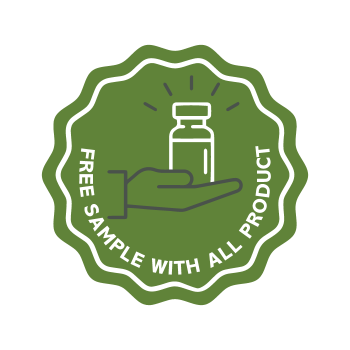Kliniczny niedobór endokannabinoidów
Kliniczny niedobór endokannabinoidów (CED) to teoria sugerująca, że brak lub dysfunkcja endokannabinoidów w organizmie może przyczyniać się do pewnych stanów zdrowotnych. Układ endokannabinoidowy (ECS) jest odpowiedzialny za utrzymanie równowagi, czyli homeostazy, w organizmie, wpływając na takie obszary jak nastrój, reakcja na ból i funkcja odpornościowa. Jeśli ECS nie produkuje wystarczającej ilości endokannabinoidów lub nie działa prawidłowo, może to potencjalnie prowadzić do niedoboru, który zakłóca te procesy, co może przyczyniać się do przewlekłych problemów zdrowotnych, takich jak migreny, fibromialgia i zespół jelita drażliwego (IBS).
Czym jest kliniczny niedobór endokannabinoidów?
Koncepcja klinicznego niedoboru endokannabinoidów (CED) została zaproponowana przez neurologa dr. Ethana Russo, który teoretyzował, że niektóre przewlekłe stany mogą wynikać z niskiego poziomu endokannabinoidów lub niedoczynnego ECS. Endokannabinoidy są naturalnie produkowane przez organizm i oddziałują z receptorami kannabinoidowymi (CB1 i CB2) w celu regulacji różnych funkcji organizmu. W zdrowym ECS endokannabinoidy pomagają organizmowi dostosować się do stresu, zarządzać stanem zapalnym i utrzymywać równowagę. Jednak u osób z CED ta równowaga może być zakłócona, prowadząc do szeregu objawów, które mogą potencjalnie przyczyniać się do przewlekłych stanów.
Chociaż teoria CED jest nadal badana, otworzyła nowe ścieżki zrozumienia skomplikowanych zaburzeń. Wiele osób z takimi schorzeniami jak IBS czy fibromialgia stwierdza, że tradycyjne leczenie przynosi ograniczoną ulgę, co prowadzi badaczy do eksploracji ECS jako celu terapeutycznego. Badania nad niedoborem endokannabinoidów zasugerowały możliwy związek, choć potrzebne są dalsze badania, aby potwierdzić i lepiej zrozumieć tę relację.
Potencjalne przyczyny i objawy klinicznego niedoboru endokannabinoidów
-
Przyczyny CED: Dokładne przyczyny CED nie są w pełni zrozumiane, ale mogą być związane z czynnikami genetycznymi, wyborami stylu życia, przewlekłym stresem i wpływami środowiskowymi, które zakłócają funkcję ECS.
-
Objawy CED: Objawy są bardzo zróżnicowane, ale mogą obejmować przewlekły ból, stan zapalny, zaburzenia nastroju i problemy trawienne. Osoby cierpiące na migreny, IBS i fibromialgię są często wymieniane jako potencjalne przykłady cierpiących na CED, ponieważ te stany są zgodne z objawami związanymi z zaburzeniem równowagi ECS.
-
Implikacje dla zdrowia: Jeśli CED zostanie udowodniony, może dostarczyć biologicznego wyjaśnienia, dlaczego niektórzy ludzie doświadczają przewlekłych stanów, które są trudne do zarządzania za pomocą tradycyjnego leczenia. Teoretycznie, uzupełnienie ECS poprzez zmiany stylu życia lub terapie oparte na kannabinoidach mogłoby pomóc przywrócić równowagę.
Podejścia oparte na kannabinoidach do zarządzania CED
Jeśli kliniczny niedobór endokannabinoidów jest rzeczywiście związany z dysfunkcją ECS, terapie oparte na kannabinoidach mogą potencjalnie pomóc w utrzymaniu poziomów endokannabinoidów. Kannabinoidy takie jak CBD i THC oddziałują z receptorami kannabinoidowymi, wpływając na funkcję ECS, co może czynić je użytecznymi w zarządzaniu objawami związanymi z CED. Oto niektóre podejścia, które są badane:
-
CBD (Kannabidiol): Znany ze swoich właściwości przeciwzapalnych, CBD może pomóc w redukcji bólu i wspierać funkcję ECS bez efektów psychoaktywnych. CBD jest szeroko stosowane przez osoby cierpiące na stany takie jak lęk i ból, które mogą być związane z CED.
-
THC (Tetrahydrokannabinol): THC oddziałuje bezpośrednio z receptorami CB1, co może pomóc w regulacji nastroju i apetytu. Dla niektórych osób małe dawki THC mogą zapewnić ulgę w objawach związanych z CED, choć ważne jest, aby używać go odpowiedzialnie.
-
Produkty Pełnospektralne: Pełnospektralne CBD zawiera szereg kannabinoidów, terpenów i innych związków roślinnych, które mogą poprawić funkcję ECS poprzez efekt świty, koncepcję, w której wiele związków działa synergistycznie dla większych efektów.
-
Zmiany Stylu Życia: Regularne ćwiczenia, zrównoważone odżywianie i zarządzanie stresem mogą naturalnie wspierać funkcję ECS, potencjalnie łagodząc niektóre objawy CED bez kannabinoidów.
Powiązane Terminy
- System Endokannabinoidowy (ECS): System organizmu do regulacji równowagi, składający się z endokannabinoidów, receptorów i enzymów, które wpływają na procesy takie jak nastrój i ból.
- Efekt Świty: Teoria, że kannabinoidy działają skuteczniej, gdy są łączone, potencjalnie wzmacniając wsparcie ECS w warunkach takich jak CED.
- Homeostaza: Zdolność organizmu do utrzymania wewnętrznej równowagi, którą ECS pomaga regulować.
Najczęściej zadawane pytania dotyczące klinicznego niedoboru endokannabinoidów
Jak diagnozuje się kliniczny niedobór endokannabinoidów?
Obecnie nie ma definitywnego testu na CED, ponieważ pozostaje to warunkiem teoretycznym. Jednak trwające badania mają na celu opracowanie metod oceny funkcji ECS i potencjalnych niedoborów.
Czy zmiany stylu życia mogą poprawić funkcję ECS?
Tak, regularne ćwiczenia, zrównoważona dieta, zarządzanie stresem i wystarczająca ilość snu mogą naturalnie wspierać funkcję ECS, potencjalnie łagodząc objawy związane z CED.
Czy istnieją dowody naukowe wspierające teorię CED?
Badania są nadal na wczesnym etapie, ale niektóre badania wskazują, że CED może być powiązane z takimi schorzeniami jak migreny, fibromialgia i IBS. Potrzebne są dalsze badania, aby potwierdzić tę teorię i zrozumieć jej implikacje.
Wspieraj swój ECS z produktami kannabinoidowymi Pharmabinoid
Pharmabinoid oferuje gamę produktów kannabinoidowych, które mogą wspierać ECS i pomagać w zarządzaniu objawami związanymi z klinicznym niedoborem endokannabinoidów. Odkryj ofertę Pharmabinoid bogatą w rozwiązania kannabinoidowe, które odpowiadają twoim potrzebom zdrowotnym.
TryPharma
Zadzwoń do nas lub wyślij e-mail, aby uzyskać więcej informacji

Bezpłatna próbka
Odkryj korzyści płynące z naszych produktów, odwiedzając naszą stronę internetową, aby uzyskać swój ekskluzywny kod TryPharma. Składając zamówienie z tym specjalnym kodem, nie tylko zabezpieczysz swoje wymagane produkty, ale także dołączymy darmową próbkę do każdego zakupu. Ta okazja pozwala Ci doświadczyć jakości naszych produktów przed złożeniem zamówienia na główną przesyłkę. Naszym celem jest zapewnienie pełnej satysfakcji z dokonanego wyboru, a ten proces zapewnia bezpieczny sposób na poznanie naszej szerokiej gamy produktów. Skontaktuj się z nami już dziś, aby rozpocząć i zrobić pierwszy krok w kierunku satysfakcjonującego doświadczenia z naszymi produktami premium.

Ubezpieczenie przesyłki
Gdy kupujesz hurtowo izolaty CBD, oleje i inne produkty od nas, Twoja przesyłka jest w pełni ubezpieczona przez nas bez dodatkowych kosztów. Korzystamy z renomowanych firm kurierskich, takich jak FedEx i UPS, do transportu, zarządzając jednocześnie ubezpieczeniem, aby zabezpieczyć każdą przesyłkę od naszego magazynu do Twojego domu. W TryPharma jesteśmy zaangażowani w wspieranie rozwoju biznesu, oferując bezpieczną usługę hurtową. W mało prawdopodobnym przypadku problemu z przesyłką, gwarantujemy zwrot pieniędzy w ciągu pięciu dni roboczych od daty potwierdzenia incydentu. Nasze kompleksowe podejście skutecznie eliminuje 99,9% wszystkich potencjalnych zagrożeń związanych z hurtową wysyłką CBD, zapewniając pełen spokój umysłu.

30-dniowy zwrot
Zapraszamy do przetestowania bezpłatnej próbki dołączonej do zamówienia przed otwarciem głównej przesyłki. Jeśli jakość nie spełnia Twoich oczekiwań, możesz skorzystać z naszej 30-dniowej polityki zwrotów. Polityka ta pozwala na zwrot produktu w ciągu 30 dni w celu uzyskania pełnego zwrotu pieniędzy, gwarantując pełne zadowolenie. Skontaktuj się z nami już dziś, aby odkryć naszą wyjątkową gamę produktów i doświadczyć naszej oddanej obsługi klienta.
Izolaty Kannabinoidowe
-
Izolat CBD - Kannabidiol
Cena regularna €369.99 EURCena regularnaCena jednostkowa / za€0.00Cena promocyjna €24.99 -
CBG - Kannabigerol
Cena regularna €999.99 EURCena regularnaCena jednostkowa / za€0.00Cena promocyjna €49.99 -
CBN - Kannabinol
Cena regularna €1,299.99 EURCena regularnaCena jednostkowa / za€0.00Cena promocyjna €79.99 -
CBC - Kannabichromen
Cena regularna €4,999.99 EURCena regularnaCena jednostkowa / za€0.00Cena promocyjna €159.99 -
CBDV - Kannabidivaryna
Cena regularna €5,999.99 EURCena regularnaCena jednostkowa / za€0.00Cena promocyjna €17.99 -
D8-THCV - Tetrahydrokannabiwaryna
Cena regularna €8,499.99 EURCena regularnaCena jednostkowa / za€0.00Cena promocyjna €144.99 -
D9-THCV - Tetrahydrokannabiwaryna
Cena regularna €7,499.99 EURCena regularnaCena jednostkowa / za€0.00Cena promocyjna €59.99 -
Izolat Cannabicitran - CBT
Cena regularna €4,449.99 EURCena regularnaCena jednostkowa / za€0.00Cena promocyjna €49.99
Kolekcje
-

Ekstrakty psychoaktywne
Odkrywanie Potencjału Ekstraktów Psychoaktywnych i Płynnego Konopi na Rynku B2B UE Dołącz...
-

Hurtowa sprzedaż oleju CBD w Europie
W Pharmabinoid jesteśmy poświęceni ukazywaniu leczniczych możliwości kannabinoidów jako alternatywy dla tradycyjnych...
-

Waporyzatory CBD
Dlaczego tak wiele osób lubi CBD Vapes? CBD to ekstrakt z przemysłowej...
-

Hurtowa sprzedaż kosmetyków CBD biała i prywatna etykieta
W ostatnich latach opracowaliśmy różne kosmetyki na bazie CBD i innych kannabinoidów,...
-

Destylaty CBD
Pozytywne aspekty destylatów CBD Destylat CBD to produkt zawierający CBD, inne kannabinoidy...
Posty na blogu
Zobacz wszystko-

"Hurtownia D9-THCB: Nawigacja po możliwościach ...
W stale zmieniającym się krajobrazie branży konopi, sprzedaż hurtowa D9-THCB wzbudziła zainteresowanie wśród europejskich dystrybutorów, którzy chcą zaspokoić rosnącą bazę klientów zainteresowaną nowymi kannabinoidami. To zainteresowanie nie jest pozbawione wyzwań,...
"Hurtownia D9-THCB: Nawigacja po możliwościach ...
W stale zmieniającym się krajobrazie branży konopi, sprzedaż hurtowa D9-THCB wzbudziła zainteresowanie wśród europejskich dystrybutorów, którzy chcą zaspokoić rosnącą bazę klientów zainteresowaną nowymi kannabinoidami. To zainteresowanie nie jest pozbawione wyzwań,...
-

"D9-THCH Hurtownie: Otwieranie możliwości na ro...
W ciągle zmieniającym się świecie kannabinoidów, skupienie na D9-THCH Hurt wzbudziło zainteresowanie wielu osób w branży. Ten mniej znany związek, Delta-9-THCH, odzwierciedla niektóre cechy THC, ale oferuje unikalny profil, który...
"D9-THCH Hurtownie: Otwieranie możliwości na ro...
W ciągle zmieniającym się świecie kannabinoidów, skupienie na D9-THCH Hurt wzbudziło zainteresowanie wielu osób w branży. Ten mniej znany związek, Delta-9-THCH, odzwierciedla niektóre cechy THC, ale oferuje unikalny profil, który...
-

"Eksplorowanie możliwości w hurtowni D9-THCPO: ...
W świecie kannabinoidów, bycie na bieżąco z pojawiającymi się związkami może być przełomowe. Możliwości hurtowe D9-THCPO przyciągnęły znaczną uwagę zarówno dystrybutorów, jak i producentów. Ale dlaczego nagle pojawiło się takie...
"Eksplorowanie możliwości w hurtowni D9-THCPO: ...
W świecie kannabinoidów, bycie na bieżąco z pojawiającymi się związkami może być przełomowe. Możliwości hurtowe D9-THCPO przyciągnęły znaczną uwagę zarówno dystrybutorów, jak i producentów. Ale dlaczego nagle pojawiło się takie...









